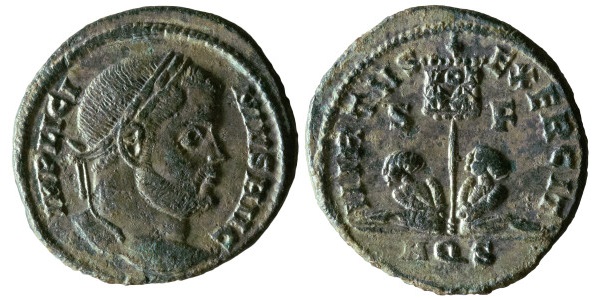November 11, 2015, by Will Leveritt
On this day in AD308 Licinius became Augustus in the West
Text by Lawrence Weston
On this day in AD 308 Valerius Licinianus Licinius became Augustus in the West, with Galerius acting as his counterpart in the East.

AE Follis of Licinius. Obverse has laureate, draped head of the emperor facing right, IMP LICI – NIVS AVG. Reverse has two bound, seated captives flanking a standard bearing the legend VOT XX, VIRTVS EXERCIT / S F, AQS in ex. 2.58g, 19mm, 12 o’clock. RIC VII Aquileia 50 var. Numismatic information by Rob Stone and Olivia Webster
Licinius had been born to a family of Dacian peasants in the Roman province of Upper Moesia and pursued a career in the Roman army. He also had the good fortune to be a childhood friend of the future emperor Galerius; this relationship would prove to be important in Licinius’ rise to power.
At this time the Roman Empire was ruled by a college of four men, a system known as the Tetrarchy. In the years shortly before Licinius’ accession the imperial college had consisted of Galerius as Augustus (senior emperor) in the East with Maximinus Daia as his Caesar (junior emperor), while the West was controlled by Severus as Augustus with the future Constantine the Great as Caesar. By 308 this system was falling apart as a number of men vied for ultimate power.
In 307, the usurper Maxentius had declared himself emperor in Rome; he brought his father Maximian – a former Augustus of the West – back into politics as his co-Augustus. Severus set out against them but was deserted by his troops and captured by Maxentius.
Galerius then took it upon himself to march on the usurpers. This prompted Maxentius to have Severus executed in September, 307. The western half of the Roman Empire now lacked a legitimate ruler.
Maximian made contact with Constantine and forged an alliance with him. This pact included raising Constantine to the rank of Augustus. Galerius’ attack on Rome failed and he retreated. Maximian then attempted to topple Maxentius and when this failed he fled to the court of Constantine.
The result of this complex situation was that on 11 November 308 an imperial council was called at the city of Carnuntum (in modern day Austria). In attendance were Galerius, Maximian, and Diocletian, former emperor and author of the system which was then falling apart.
It was agreed by all that Maximian must once more retire, whilst Constantine was demoted back to the rank of Caesar. It was at this meeting that Galerius had his old friend and comrade, Licinius, appointed as the legitimate Augustus of the West, to replace the murdered Severus.
He developed a rivalry with Maximinus Daia, with whom he had jointly split the Eastern Empire at the time of Galerius’ death in 311. He soon began forming an alliance with Constantine, which was secured in 313 when Licinius married Contantine’s half-sister, Flavia Julia Constantina.
Later in 313 Licinius managed to defeat Maximinus during his attempt to conquer Thrace and forced him all the way to the city of Tarsus, where in August he died during the siege of the city due to illness, leaving Licinius and Constantine to the rulers of the Roman Empire.
Relations between these two were rocky, as both vied to become sole ruler. Eventually, Licinius and Constantine fell out over the appointment of Contantine’s brother-in-law, Bassianus, to the position of Caesar with control over Italy and the Danubian Provinces.
Licinius saw Bassianus as an agent of Constantine’s, and resented the loss of his territory along the Danube. Thus Licinius sought to plot against Constantine by inciting Bassianus to revolt. However, he was discovered in the plot by Constantine and the two went to war in 316, though they made peace again in 317.
Licinius became more and more dissatisfied with Constantine’s decisions, particularly his pro-Christian policies (Licinius persecuted Christians in his part of the empire), and he began to advance his own interests, even going so far as to appoint himself and his two sons as consuls for 322 without consulting Constantine, an act of blatant aggression.
In 324 the sides were at war again after Constantine had entered Licinius’ territory while chasing down a group of Gothic invaders. Licinius used this as an excuse to try to remove Constantine once and for all, but he was defeated at the Battle of Chrysopolis in September 324.
He was initially spared through a plea from his wife, but in 325 Constantine had him hanged, under a charge of attempting to raise a rebel army amongst barbarians.
No comments yet, fill out a comment to be the first

Leave a Reply